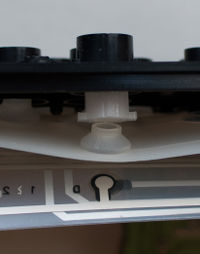Rubber dome
This article is a stub. You can help Deskthority by expanding it.

Rubber dome is a type of keyboard switching technology that is most commonly used on modern keyboards, using collapsible rubber domes to provide resistance and tactility to keys. Where all the domes are formed from a single sheet of plastic, they may be referred to (especially by Cherry) as rubber sheet keyboards. In most cases these days, keyboards will be rubber dome over membrane.
Description
In rubber dome keyboards, the collapsible rubber domes replace the helical springs found in other switch types. In some cases, metal springs are still used, including the Fujitsu Peerless switch and one Alps integrated dome variant. The domes themselves can be discrete objects, or collectively manufactured as a single sheet of rubber. When discrete, they may be glued down onto the top membrane sheet. A single keyboard may use multiple smaller sheets of domes.
Most rubber dome keyboards use a membrane contact sheet below the dome to provide electrical switching, but certain rubber dome switches, such as Topre switches, use capacitive switching, and a small number of boards used a PCB.
A related design is buckling rubber sleeve, which is a rubber collar that sits around the slider and functions largely identically to a dome.
Varieties

- Plain rubber dome
- A slider is moulded into the keycap (Integrated mount) that pushes down on the dome; this is the most common variety
- Dome with slider
- Similar to more expensive discrete switches, each key position has a slider that presses on the dome, onto which the keycap is mounted; on some keyboards the slider has a standard Cherry MX mount or Alps mount interface and the board will accept keycaps from mechanical keyboards and donate keycaps for mechanical boards. Dome switches with sliders are now uncommon, but this is the form taken by Topre switches; NMB dome with slider and BTC dome with slider are two of the better-known membrane implementations.
- Scissors
- Laptop keyboards introduced the use of scissor-like mechanisms to stabilise low travel switches that lack a shaft for the keycap to slide inside
Contact mechanism
Dome switch keyboards use several contact mechanisms:
- Pressure
- The "ceiling" of the dome presses two plastic membranes together to connect circuit traces; such keyboards require three membrane layers: upper and lower with exposed conductive traces, and a separator sheet to keep the conductor membranes separated until pairs of contacts are pressed together. This is the most common type of rubber dome over membrane keyboard.
- Conductive
- The ceiling of the dome is coated with carbon, and this conductive layer connects a pair of circuit traces together; the circuit layer can be a membrane, PCB, or (as with the Alps integrated dome switch), metal contacts.
- Capacitive
- Topre Realforce keyboards use the rubber dome solely as a spring, and switch actuation is performed using capacitance via a 5 cN spring compressed by the dome.
Gallery
Dome and membrane sheets from a Dell L100 office keyboard
Pressure domes from the AppleDesign Keyboard, glued down onto the top membrane sheet
Scissor switch with its rubber dome
Metal contacts in the Alps integrated dome discrete conductive dome switch
Conductive dome PCB, from a Key Mouse RB-2001-1 keyboard[1]
References
- ↑ KBTalking — ⊙.⊙非簧片類導電橡膠鍵盤RB-2001-1簡介⊙.⊙








